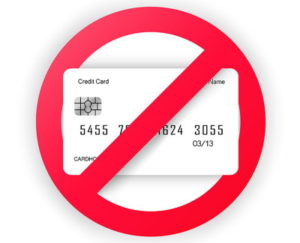 One of the biggest concerns for people that enjoy betting is that doing so will affect their credit score. Having a good credit score is vital for any number of things, from getting a car through to taking out a loan. For that reason, bettors might be worried that engaging in the pastime could leave them short when it comes to applying for credit in whatever form that they choose to do so.
One of the biggest concerns for people that enjoy betting is that doing so will affect their credit score. Having a good credit score is vital for any number of things, from getting a car through to taking out a loan. For that reason, bettors might be worried that engaging in the pastime could leave them short when it comes to applying for credit in whatever form that they choose to do so.
The short answer is that placing bets is less likely to affect your credit score since it is no longer allowed to use credit cards to add funds to gambling accounts. Sites can perform credit checks to verify who you are but these are known as soft credit checks and cannot affect your score.
The longer answer is that it can depend. If you were to go overdrawn in order to add money into your gambling account, for example, that might go against you. Lenders may also look on you unfavourably on gambling transactions if you have gambled in the past, even if you can afford to lose that money.
Why Does A Good Credit Score Matter?
 Not everyone will either care about their credit score or realise how important it can be. Credit scores are seen as one of the building blocks of your financial health, with higher credit scores equating to more bricks with which to build. Having a good credit score can then open up a wealth of savings and benefits to you, including access to loans at competitive rates, which you might need for something such as a home improvement.
Not everyone will either care about their credit score or realise how important it can be. Credit scores are seen as one of the building blocks of your financial health, with higher credit scores equating to more bricks with which to build. Having a good credit score can then open up a wealth of savings and benefits to you, including access to loans at competitive rates, which you might need for something such as a home improvement.
Other things like credit cards with favourable terms are also often restricted to people that have a good credit score. Being able to borrow money that you then pay back over time can give you the ability to buy things that you might not otherwise be able to afford. A new home is an obvious example, whilst more frivolous things such as a car or boat can also be on the list. Credit scores are one of the factors that are considered by lenders.
Other factors, such as your income and your debt-to-income ratio will also be included, as your employment history might also be. The mathematical algorithm that determines your credit score will also be looked at, though, and that’s the one that you can have the most control over. Doing things like having a low credit utilisation ratio and limiting the number of accounts you have will improve your credit score.
Gambling & Your Credit Score
 In the past, credit scores could be affected by gambling more easily because punters were able to use credit cards to add money to their betting accounts. This was banned in April of 2020 after a public consultation, meaning that it is no longer a way in which you can see your credit score take a hit. That doesn’t mean that you’re completely out of the woods on that front, however, with gambling still able to impact your credit rating.
In the past, credit scores could be affected by gambling more easily because punters were able to use credit cards to add money to their betting accounts. This was banned in April of 2020 after a public consultation, meaning that it is no longer a way in which you can see your credit score take a hit. That doesn’t mean that you’re completely out of the woods on that front, however, with gambling still able to impact your credit rating.
The reality is that the vast majority of bettors will see more money going out of their accounts than coming in. This can give lenders the impression that such people are not trustworthy when it comes to their handling of money, which will be seen as a red flag. For most players, the actual affect on their credit score will be minor, but it’s still something that you need to bear in mind; especially if you’re looking to get credit for something.
The public perception of gambling has changed over the years, with the modern version of it seen as an acceptable leisure activity that most people engage in in one form or another. Even those that don’t consider themselves to be gamblers may have bought a lottery ticket at one point or another. Occasional gambling is unlikely to impact your credit score massively, as long as you keep on top of your finances in other ways.
Don’t Borrow To Gamble
 The best advice that anyone hoping to have a good credit score can be given is that they should avoid borrowing money for the purposes of gambling. We know that you can’t use a credit card to load money onto a betting account any more, but you should also avoid doing things such as taking a money transfer from a credit card to give yourself some gambling money or applying for a personal loan for use in gambling. Anything like that will be looked on unfavourably by lenders.
The best advice that anyone hoping to have a good credit score can be given is that they should avoid borrowing money for the purposes of gambling. We know that you can’t use a credit card to load money onto a betting account any more, but you should also avoid doing things such as taking a money transfer from a credit card to give yourself some gambling money or applying for a personal loan for use in gambling. Anything like that will be looked on unfavourably by lenders.
Of course you can’t actually get a personal loan to use to gamble, if you told a company that is what you are using the money for they won’t lend it to you in the first place. Therefore the only way these days to use credit to gamble is through unscrupulous means, so naturally if that is discovered it is likely to have a negative effect on how you are seen by financial companies.
You should also work hard to avoid going into your overdraft in order to add money to a betting account. In many ways, this will be judged just as harshly as using a credit card for the purpose, seeing as though it involves spending money that you don’t have. Anyone who is seen to gamble on a frequent basis will be considered as a risk by a money lender, who will think twice before giving them more money.
Bets Placed Are Not Reported To Credit Agencies
 The truth of the matter is that placing a bet isn’t in and of itself something that will be reported to credit agencies. That’s why it’s so important to avoid using credit to place bets, because the addition of credit to your file is something that will be noted, regardless of what it’s spent on. Equally, applying for something big or that requires a lot of money, such as a mortgage, will involve a closer look at your finances.
The truth of the matter is that placing a bet isn’t in and of itself something that will be reported to credit agencies. That’s why it’s so important to avoid using credit to place bets, because the addition of credit to your file is something that will be noted, regardless of what it’s spent on. Equally, applying for something big or that requires a lot of money, such as a mortgage, will involve a closer look at your finances.
This is where any time spent gambling in any major way can become problematic, with lenders then being able to see that you’ve been doing it without it having been reported to credit agencies. Of course, it ultimately comes down to affordability. It might not be reported to credit agencies, but someone that earns £1 million a year will be viewed more favourably for £10,000 worth of gambling than someone on £20,000 a year.
Some people gamble via eWallets (such as PayPal), these are payment gateways that allow you to use funds from your bank account but via a third-party wallet. People use these to gamble for all sorts of reason, such as keeping track of profit and loss in a dedicated account, but also because it stops gambling transactions appearing on bank statements when scrutinised.
Irresponsible Gambling Is The Main Factor
 Gambling isn’t de facto something that will count against your credit score. The act in and of itself isn’t such a heinous thing that money lenders will immediately turn you down for doing it. In essence, your credit score is an assessment of whether or not you’ll be able to pay back any money that you’ve borrowed, so if it appears as if you’ll be able to then you won’t need to worry about the fact that you bet on the horses occasionally.
Gambling isn’t de facto something that will count against your credit score. The act in and of itself isn’t such a heinous thing that money lenders will immediately turn you down for doing it. In essence, your credit score is an assessment of whether or not you’ll be able to pay back any money that you’ve borrowed, so if it appears as if you’ll be able to then you won’t need to worry about the fact that you bet on the horses occasionally.
The thing that will be most closely monitored by money lenders is whether you appear to be an irresponsible gambler or not. That’s why the likes of using your overdraft to gamble or borrowing money to do so will have a detrimental affect on your credit. You’ll know yourself what level your gambling is at, so it’s vital that you get it under control well in advance of making any credit applications such as for a mortgage or a loan.
